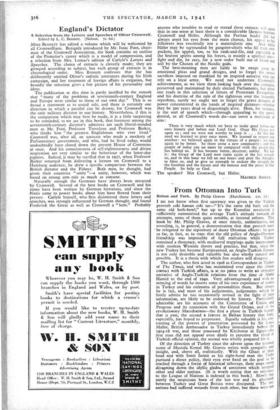England's Dictator
A Selection from the Letters and Speeches of Oliver Cromwell. Edited by L. C. Bennett. (Nelson. 7s. 6d.) Miss BENtarr has edited a volume which will be welcomed by all Cromwellians. Benignly introduced by Mr. Isaac Foot, chair-
man of the Cromwell Association, the book contains an outline of the Protector's career which is a model of coinpression, and a selection from Mrs. Lomas's edition of Carlyle's Letters and Speeches. The choice of extracts is cleverly made; they are grouped according to subject, but each group of extracts is in chronological order. Miss Bennett confesses that she has deliberately omitted Oliver's sadistic utterances during his Irish campaign, and her treatment of foreign affairs is exiguous, but broadly the selection gives a fair picture of his personality and ideas.
The publication at this time is partly justified by the remark that " many of the problems of seventeenth-century England and Europe were similar to those of our own day." This is so broad a statement as to sound safe, and there is certainly one direction in which a parallel can be drawn; for Cromwell was the only military dictator in our history. Nevertheless, if this is the comparison which may best be made, it is a little surprising to be reminded, as we are in this book, that foremost among the seventeenth-century dictator's admirers are such liberal-minded men as Mr. Foot, Professor Trevelyan and Professor Barker, who thinks him " the greatest Englishman who ever lived." Cromwell was, after all, an autocrat who made a mockery of Parliamentary government, and who, had he lived today, would undoubtedly have closed down the present House of Commons at once. And his consciousness of self-righteousness and divine inspiration are very similar to the behaviour of the latter-day pigmies. Indeed, it may be recalled that in 037, when Professor Barker returned from delivering a lecture on Cromwell to a Hamburg audience, he drew a specific comparison between the British dictator and the Fiihrer. Both men, he thought, had given their countries "unity "—a unity, however, which was based on strong arm rule as much as consent.
Naturally enough the Germans have always been attracted by Cromwell. Several of the best books on Cromwell and his times have been written by German historians, and since the Nazis came to power books about him have flowed from their presses. Carlyle himself, who first disinterred these letters and speeches, was strongly influenced by German thought, and found Frederick the Great as well as Cromwell a " hem." Probably
anyone who troubles to read or reread these extracts will agree that in one sense at least there is a considerable likeness between Cromwell and Hider. Although the Puritan leader did not always avert his eyes from the main chance, his appeal to his followers was essentially not a materialistic one. And while Hider may -be sujrounded by gangster-chiefs who fill their own pockets, his appeal, too, to his rank-and-file, and especially to the braveit spirits among his forces, is mainly a spiritual one— fight and die, he says, for a new order built out of blood and soil -by the Chosen of the Nordic gods.
The best-meaning men are liable to be swept away by emotional pleas and grand designs, and to forget the severe sacrifices imposed on mankind by an inspired autocrat who can rely on a loyal army. We need not underrate Cromwell's achievements, as we view them looking back over the centuries, preserved and maintained by duly elected Parliaments, but when one reads in this selection of letters of Protestant Evangelism, and his doctrine of the rule of the righteous over the incurably reprobate, surely we ought not to forget the grave dangers of power concentrated in the hands of inspired dictators—whether they be 30o years dead or disgustingly alive. Here, for instance, is the sort of speech which—through appealing to the provi- dential, as all Cromwell's words do—can cover a multitude of sins :
There is very -much which we have to make good before our own history and before our Lord God. Once His Grace was upon us; and we were not worthy to keep it. . . . In this dire need we learned to pray once more. We learned to respect one another: we believed again in the virtues of a people: we tried again to be better. So there arose a new community ; and this people of today can no more be compared with the people that lies behind us. It has become better, decenter, nobler. We feel it: the Grace of the Lord now turns again at the last towards us, and in this hour we fall on our knees and pray the Almighty to bless us, and- to give us strength to endure the struggle for the freedom and the future and the honour and the peace of Our People. So help us God.
The speaker? Not Cromwell, but Hitler.
. MAURICE ASIIITY.






































 Previous page
Previous page